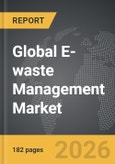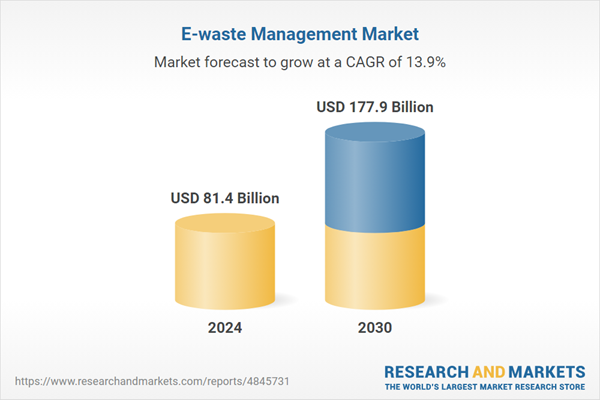Global E-waste Management Market - Key Trends and Drivers Summarized
How is E-Waste Management Shaping the Future of Sustainable Technology Disposal?
E-waste management has become a critical aspect of environmental sustainability, driven by the rapid proliferation of electronic devices and the increasing need for responsible disposal methods. E-waste, or electronic waste, refers to discarded electronic products such as smartphones, laptops, televisions, and household appliances that have reached the end of their life cycle. These devices often contain hazardous materials like lead, mercury, and cadmium, which can leach into the soil and water systems, causing significant environmental harm if not disposed of properly. E-waste also contains valuable materials, including precious metals like gold, silver, and copper, which can be recovered and reused through proper recycling processes. Effective e-waste management aims to minimize the environmental impact of discarded electronics while maximizing the recovery of valuable materials, thereby reducing the need for mining raw materials and promoting a circular economy.As global demand for electronic devices continues to soar, the volume of e-waste has reached alarming levels. According to the Global E-waste Monitor, the world generated over 53 million metric tons of e-waste in 2020, and this figure is expected to grow significantly in the coming years. Unfortunately, a large portion of this waste ends up in landfills, particularly in developing countries where improper disposal methods are common. In response to this growing problem, many governments and organizations have implemented e-waste management policies and regulations designed to ensure that electronic products are disposed of responsibly. These initiatives often include extended producer responsibility (EPR) programs, which require manufacturers to take responsibility for the entire lifecycle of their products, from production to disposal. By adopting such measures, the e-waste management sector is helping to mitigate the environmental impact of technology and reduce the burden on natural resources.
Why is E-Waste Management Critical for Global Sustainability Efforts?
E-waste management is crucial for advancing global sustainability efforts, as improper disposal of electronic waste poses severe environmental and public health risks. Many electronic devices contain toxic chemicals that, when not handled correctly, can release harmful substances into the air, soil, and water. For instance, lead, a common component in older electronics, can cause neurological damage, especially in children, when it contaminates local water supplies. Moreover, e-waste contributes significantly to the growing problem of electronic pollution, with devices piling up in landfills or being incinerated, releasing toxic fumes. Proper e-waste recycling ensures that hazardous materials are safely extracted and processed, preventing them from causing harm to ecosystems and human health. Additionally, recycling e-waste reduces the need for extracting new raw materials, which can be environmentally destructive, requiring vast amounts of energy and water.Beyond the environmental benefits, e-waste management plays an essential role in resource conservation. Electronic devices are rich in precious metals and rare earth elements, which are critical for manufacturing new technology. For example, gold, silver, and platinum are used in circuit boards and processors, while rare earth elements are essential for manufacturing batteries, magnets, and display screens. By recycling old electronics, these valuable materials can be recovered and reused, reducing the demand for mining and the associated environmental damage. Furthermore, recycling electronic components can help address the global shortage of these critical materials, ensuring a stable supply chain for the tech industry. As more countries implement stricter e-waste regulations and consumers become more conscious of their environmental footprint, e-waste management is becoming a key pillar of the broader push toward a circular economy, where products are designed for longevity, reuse, and recyclability.
Where is E-Waste Management Being Applied, and What Are Its Expanding Applications?
The application of e-waste management practices has expanded significantly across various sectors as governments, industries, and individuals recognize the importance of responsible electronic disposal. One of the primary areas where e-waste management is gaining traction is in the tech manufacturing industry, where companies are adopting eco-friendly policies to handle the disposal and recycling of electronic products. Major electronics manufacturers, including companies like Apple, Dell, and HP, have developed take-back programs that allow customers to return their old devices for recycling. These companies are increasingly integrating recycled materials into new products, reducing their reliance on raw materials and minimizing their environmental impact. In addition to product recycling, some manufacturers are exploring innovative methods such as modular design, which allows users to replace or upgrade individual components rather than discarding an entire device. This approach not only extends the life of electronic products but also reduces the volume of e-waste generated.The public sector is also playing a pivotal role in e-waste management, particularly in municipal waste systems and government-led recycling initiatives. Cities and local governments around the world have begun implementing dedicated e-waste collection points, encouraging citizens to dispose of their electronics responsibly. Moreover, e-waste management is becoming increasingly important in the renewable energy sector, particularly in the recycling of solar panels, wind turbines, and electric vehicle batteries. As renewable technologies continue to expand, the industry must address the challenge of managing end-of-life materials, many of which contain valuable yet hazardous elements. The ability to efficiently recycle these components will be essential for the long-term sustainability of renewable energy systems. E-waste management is also critical in data centers and the telecommunications industry, where rapid technological advancements result in frequent equipment upgrades. Recycling obsolete servers, routers, and other hardware not only reduces environmental impact but also ensures the safe disposal of sensitive data.
What Factors Are Driving the Growth of the E-Waste Management Market?
The growth in the e-waste management market is driven by several factors, including increasing electronic consumption, stricter environmental regulations, and growing awareness of the environmental impact of e-waste. The proliferation of electronic devices, fueled by technological advancements and shorter product life cycles, has resulted in a significant rise in e-waste generation. Consumers are upgrading their smartphones, laptops, and other electronics more frequently, leading to an accumulation of discarded devices. This surge in electronic waste has spurred governments to implement more stringent regulations aimed at promoting responsible disposal and recycling. Many countries have introduced legislation requiring manufacturers to take responsibility for the end-of-life management of their products, a concept known as extended producer responsibility (EPR). Under these frameworks, manufacturers are incentivized to design products that are easier to recycle, disassemble, and repair, which reduces the overall volume of e-waste.Another major driver of the e-waste management market is the increasing awareness among consumers and businesses regarding the environmental and economic benefits of recycling electronics. Public awareness campaigns and educational initiatives have encouraged individuals to think more critically about how they dispose of their electronic devices. Businesses, too, are recognizing the financial advantages of e-waste recycling, as it allows them to recover valuable materials and reduce disposal costs. Furthermore, advancements in recycling technologies are making e-waste management more efficient and cost-effective. New methods, such as hydrometallurgical and pyrometallurgical processes, enable the recovery of precious metals from electronic devices with greater precision and less environmental impact. The development of these innovative recycling techniques is expected to further fuel the growth of the e-waste management market. Additionally, the growing demand for refurbished electronics, driven by cost-conscious consumers and environmental concerns, is contributing to the expansion of the e-waste management industry, as more companies enter the market to refurbish and resell old devices.
Report Scope
The report analyzes the E-waste Management market, presented in terms of market value (USD). The analysis covers the key segments and geographic regions outlined below.- Segments: Segment (Metals, Plastic, Glass, Other Segments); End-Use (Disposal, Recycle).
- Geographic Regions/Countries: World; United States; Canada; Japan; China; Europe (France; Germany; Italy; United Kingdom; and Rest of Europe); Asia-Pacific; Rest of World.
Key Insights:
- Market Growth: Understand the significant growth trajectory of the Metals segment, which is expected to reach US$96.8 Billion by 2030 with a CAGR of 14%. The Plastic segment is also set to grow at 15.3% CAGR over the analysis period.
- Regional Analysis: Gain insights into the U.S. market, valued at $22 Billion in 2024, and China, forecasted to grow at an impressive 12.8% CAGR to reach $26.7 Billion by 2030. Discover growth trends in other key regions, including Japan, Canada, Germany, and the Asia-Pacific.
Why You Should Buy This Report:
- Detailed Market Analysis: Access a thorough analysis of the Global E-waste Management Market, covering all major geographic regions and market segments.
- Competitive Insights: Get an overview of the competitive landscape, including the market presence of major players across different geographies.
- Future Trends and Drivers: Understand the key trends and drivers shaping the future of the Global E-waste Management Market.
- Actionable Insights: Benefit from actionable insights that can help you identify new revenue opportunities and make strategic business decisions.
Key Questions Answered:
- How is the Global E-waste Management Market expected to evolve by 2030?
- What are the main drivers and restraints affecting the market?
- Which market segments will grow the most over the forecast period?
- How will market shares for different regions and segments change by 2030?
- Who are the leading players in the market, and what are their prospects?
Report Features:
- Comprehensive Market Data: Independent analysis of annual sales and market forecasts in US$ Million from 2024 to 2030.
- In-Depth Regional Analysis: Detailed insights into key markets, including the U.S., China, Japan, Canada, Europe, Asia-Pacific, Latin America, Middle East, and Africa.
- Company Profiles: Coverage of players such as 3R Recycler Pvt. Ltd., Ace Equipment Co., ADL Process, Inc., Aevitas Co., Ama Roma S.p.A. and more.
- Complimentary Updates: Receive free report updates for one year to keep you informed of the latest market developments.
Some of the 14 companies featured in this E-waste Management market report include:
- 3R Recycler Pvt. Ltd.
- Ace Equipment Co.
- ADL Process, Inc.
- Aevitas Co.
- Ama Roma S.p.A.
- Aqua Metals, Inc.
- Arcas Technology
- Arrow Value Recovery
- Attero
- Australia and New Zealand Recycling Platform Ltd
This edition integrates the latest global trade and economic shifts into comprehensive market analysis. Key updates include:
- Tariff and Trade Impact: Insights into global tariff negotiations across 180+ countries, with analysis of supply chain turbulence, sourcing disruptions, and geographic realignment. Special focus on 2025 as a pivotal year for trade tensions, including updated perspectives on the Trump-era tariffs.
- Adjusted Forecasts and Analytics: Revised global and regional market forecasts through 2030, incorporating tariff effects, economic uncertainty, and structural changes in globalization. Includes historical analysis from 2015 to 2023.
- Strategic Market Dynamics: Evaluation of revised market prospects, regional outlooks, and key economic indicators such as population and urbanization trends.
- Innovation & Technology Trends: Latest developments in product and process innovation, emerging technologies, and key industry drivers shaping the competitive landscape.
- Competitive Intelligence: Updated global market share estimates for 2025, competitive positioning of major players (Strong/Active/Niche/Trivial), and refined focus on leading global brands and core players.
- Expert Insight & Commentary: Strategic analysis from economists, trade experts, and domain specialists to contextualize market shifts and identify emerging opportunities.
Table of Contents
Companies Mentioned (Partial List)
A selection of companies mentioned in this report includes, but is not limited to:
- 3R Recycler Pvt. Ltd.
- Ace Equipment Co.
- ADL Process, Inc.
- Aevitas Co.
- Ama Roma S.p.A.
- Aqua Metals, Inc.
- Arcas Technology
- Arrow Value Recovery
- Attero
- Australia and New Zealand Recycling Platform Ltd
Table Information
| Report Attribute | Details |
|---|---|
| No. of Pages | 182 |
| Published | February 2026 |
| Forecast Period | 2024 - 2030 |
| Estimated Market Value ( USD | $ 81.4 Billion |
| Forecasted Market Value ( USD | $ 177.9 Billion |
| Compound Annual Growth Rate | 13.9% |
| Regions Covered | Global |









